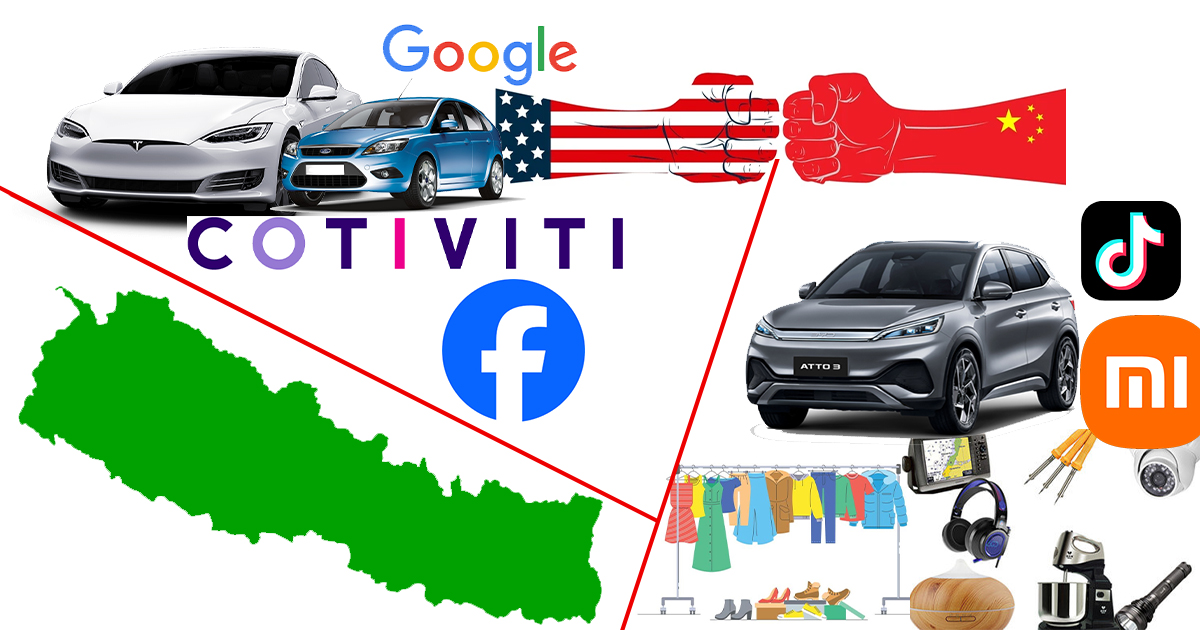Kathmandu: The US administration has expressed discontent with Nepal, accusing it of imposing higher tariffs on American products while favouring Chinese goods with lower duties.
The situation has further escalated due to a series of unusual regulatory actions against US tech companies, which has added to Washington’s frustration.
Specifically, Nepal has been levying lower customs tariffs on Chinese electric vehicles while placing higher duties on American cars. According to Nepal’s foreign trade statistics, tariffs on Chinese cars go up to 269 percent, whereas American cars face as much as 336 percent. US alcoholic beverages are subjected to tariffs as high as 700 percent.
Nepal collects customs duties, excise, and VAT at entry points on imported goods. Recently, the Trump administration has concluded that Nepal has been embracing Chinese goods and services while treating American products unfavourably. As a result, Chinese automakers like BYD have benefited, while American brands such as Ford, Jeep, and Tesla face higher import duties.
The government has also repeatedly pressured US social media and IT companies—sometimes shutting them down, sometimes threatening closure if they fail to register, issuing notices to integrate into the tax system, or filing lawsuits over alleged unpaid taxes.
After his re-election, in February, President Donald Trump imposed a 10 percent “reciprocal tax” on Nepal along with several other countries. Since then, the US has been adjusting such tariffs on different countries depending on how it perceives their treatment of American products. For example, additional tariffs on Indian goods entering the US market came into effect this Wednesday.
Previously, 77 Nepali goods entered the US duty-free. However, since the reciprocal tariff policy, an additional 10 percent duty has been levied on them. In fact, the US has already been imposing high tariffs on some Nepali products: 45 percent on polyester goods and 59 percent on footwear.
“Even though the US had allowed 77 Nepali products into its market duty-free, Nepal adopted a policy of imposing higher tariffs on American goods compared to others. That has angered the Trump administration,” a businessman said. “Our failure to reciprocate fairly will have consequences in Trump’s upcoming tariff policies.”
US embassy officials reportedly responded that Nepal promotes Chinese goods while discriminating against American companies, suggesting tariffs should instead be raised further.
Businesspeople who previously benefited from zero-duty access had appealed to the US Embassy to roll back the 10 percent additional tariff. But embassy officials reportedly responded that Nepal promotes Chinese goods while discriminating against American companies, suggesting tariffs should instead be raised further. This issue has been widely discussed within the American Chamber of Commerce in Nepal (AmCham) and the Nepal-USA Chamber of Commerce and Industry (NUSACCI).
However, US officials may not have fully grasped the actual picture. According to Nepal’s Customs Department, last fiscal year, Nepal imported goods worth Rs 25.97 billion from the US, collecting Rs 4.42 billion in customs revenue—an average tariff of 17 percent. By comparison, imports from China totaled Rs 341.10 billion, with Rs 94.13 billion collected in revenue, showing an average tariff of 28 percent.
Moreover, Nepal placed zero tariffs on 18 categories of American goods last year. Still, certain government actions have displeased Washington. For example, on 1 April 2024, Nepal’s Department of Revenue Investigation filed a case against Cotiviti Nepal, a subsidiary of US software company Cotiviti Inc., accusing it of tax evasion. The government alleged failure to disclose shareholding changes and non-payment of VAT while selling software to its parent company, claiming Rs 5.18 billion was evaded and demanding Rs 10.36 billion in penalties.
But under Nepali law, service exports are subject to zero VAT. Nonetheless, after the case was filed, Cotiviti Nepal exited, and around 700 employees moved to the Indian-owned Infinite Computer Solutions.
Meanwhile, President Trump has threatened to impose additional tariffs on countries that introduce digital taxes, digital services laws, or digital market regulations targeting US tech giants. Posting on his Truth Social platform, he accused such nations of undermining or discriminating against American technology while exempting major Chinese firms, calling for an immediate end to the practice.
He warned that any country imposing such regulations would face higher tariffs on exports to the US and also announced restrictions on the export of sensitive US technologies and chips. According to Trump, US tech companies are “neither the piggy bank not the doormat of the World” and must be respected globally, or consequences will follow.
Although Trump did not name specific countries, his criticism clearly pointed to the European Union’s Digital Markets Act (DMA) and Digital Services Act (DSA). The DMA aims to curb monopolistic practices of big tech firms to ensure fair competition, while the DSA targets harmful online activities and misinformation.
While Trump issued these warnings, Nepal’s government has decided to regulate social media platforms within the country. On August 25, the Cabinet decided to give platforms, including Facebook, seven days to register with the Ministry of Communication and Information Technology.
According to the 2023 Social Media Directive and a Supreme Court order, the government seeks to make these platforms accountable. Failure to register within the given timeframe or establish contact will result in their deactivation in Nepal. The Cabinet has instructed the Nepal Telecommunications Authority to enforce this decision.



Comment Here